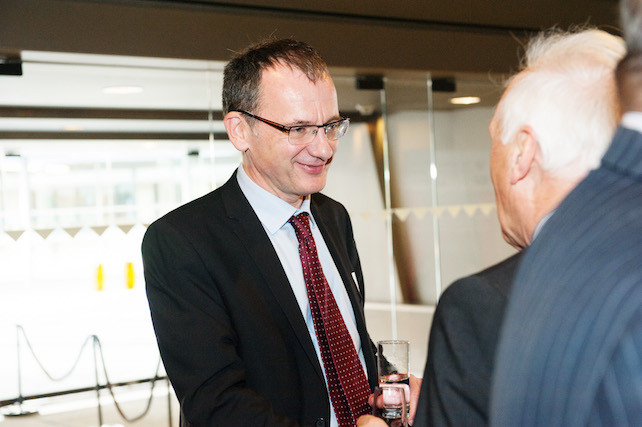At a press meeting on Wednesday 17 January, John Marshall gave his usual optimistic assessment of the Brexit negotiations and that it was “in everyone’s interests to have a comprehensive deal.”
He laid out three broad work streams for the upcoming months: translating the December European Council agreement into a legal text, continuing discussions on phase 1 issues, returning to those issues that were not part of the headlines such as the Euratom treaty, privileges and immunities, goods on the market, and discussions on the transition period.
While the UK has suggested a transition period of 2 years, ending in March 2021, the European Commission proposed it ending on 31 December 2020. Marshall said the difference was small between the two proposals and a deal was achievable by the March European Council. Flexibility was needed, Marshall said. On that issue, recent EU Commission proposals indicate that the EU would like freedom of movement to continue during that period. The UK instead wants to introduce a registration system for people arriving in the UK during that period.
No second referendum
Marshall excluded the possibility of a second referendum on UK EU membership, saying that his government was “entirely focused on negotiating the terms of the withdrawal and a future partnership with the EU.”
Third country status
David Davis reportedly sought legal advice on challenging the EU because its preparations for a no deal scenario were “damaging the UK’s interests” and referred to the UK as “a third country”. A third country is any country which is not a member of the EU.
When asked whether the British government intended to take this any further, the British ambassador stated that “it is clear that we will be a third country”, but that the UK was a special case because it already had total regulatory convergence with EU norms, rules and regulations, and the country was “at the doorstep of the EU”. Hence, a future agreement should go beyond the templates of other third countries’ agreements. Neither the Norway nor the Swiss model would be “the right kind of model for us”, Marshall said.
He added that he hoped the European Commission guidelines, to be agreed by the member states, “will not be too restrictive” and “allow for negotiations on all possible options.”
When asked whether the British government would adopt a top-down or bottom-up approach to future trade talks, Marshall said that these discussions were still taking place.
Taking the devolved regions into account
A recent analysis by the Scottish government revealed that leaving the EU single market and the customs unions would cost its economy £13bn a week. Marshall said that the government had “very regular conversations and a formal mechanism to consult with the devolved administrations.”
Reassuring British residents
The British ambassador also announced that he is planning to co-organise an informational event in conjunction with British residents’ rights group Brill to reassure and inform British residents living in Luxembourg on the outcome of the European Council December meeting. He added that it will be announced on social media and was likely to take place in February, but could not yet give more details.
